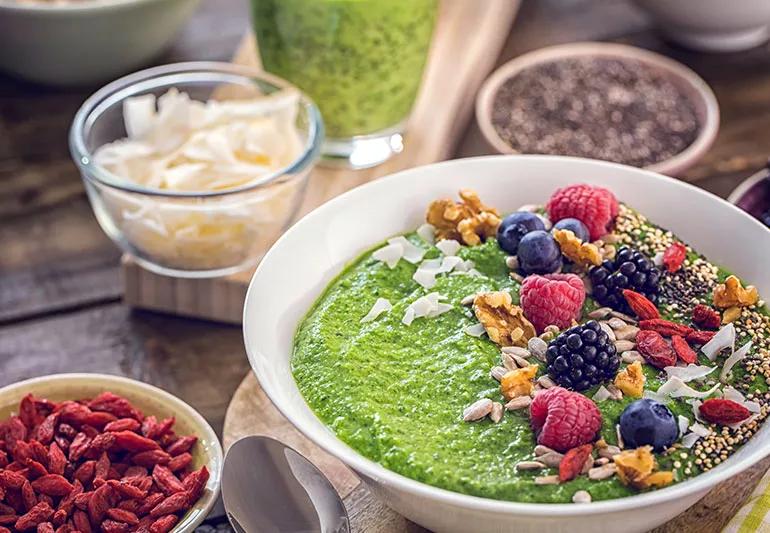There’s usually a simple answer, but it also can be a reason for concern

Image content: This image is available to view online.
View image online (https://assets.clevelandclinic.org/transform/123a30f3-5fe9-421d-92d5-96be18f5fa67/WhyPoopIsGreen-543813586-770x533-1_jpg)
A table with a bowel of green food and berries
There’s an expectation as to what you’ll see in the toilet after pooping. So when you look down into the water and spot something bright green… well, it’s safe to say a few questions might enter your mind.
Advertisement
Cleveland Clinic is a non-profit academic medical center. Advertising on our site helps support our mission. We do not endorse non-Cleveland Clinic products or services. Policy
For answers, let’s turn to gastroenterologist Christine Lee, MD.
Let’s start with a basic fact: You’re not alone in finding an unexpectedly verdant dash of color in the toilet bowl following a splashdown. “The color and shade of a bowel movement can vary day by day,” says Dr. Lee. “It’s like life — always changing and never the same.”
So what causes it? Let’s look at some potential Technicolor triggers.
What you’re eating is the most likely explanation for green poop — especially if you tend to nibble on garden fares such as broccoli, kale and spinach. The chlorophyll that gives those vegetables their green color can do the same to your poop.
Other potential food and drink sources that could make you go green include:
A less organic force — green food dye — also could be behind the Hulk-like hue on a #2. (Consider this the consequence of eating a St. Patrick’s Day cupcake with unnaturally bright green frosting.)
In any food-related case, the funky tint should disappear within a day or two once the source is flushed out of your system, says Dr. Lee.
Advertisement
Antibiotics can lead to small — and potentially colorful — changes to the way your body digests food. The reason? The medication can alter the bacteria flora in your gut, which can add a greenish tint to what comes out.
Some medications may upset your stomach, too, resulting in bile-filled diarrhea that looks a bit green.
“Turning green” has long been a phrase used to describe someone showing signs of an illness. The same can be said of your poop, too, notes Dr. Lee.
Greenish stool could indicate that you have a bacterial infection (salmonella or E. coli, for example), viral infection (norovirus) or a parasite (Giardia) causing a rapid transit “gush” of unabsorbed bile.
Green poop also could be a symptom of:
One word of caution, though, before you start fretting at the drop of a doo-doo: “All of these health issues are possible, but they’re not the norm,” says Dr. Lee. “If you feel perfectly fine and don’t have diarrhea, a different color bowel movement is most likely linked to something you ate.”
Any number of colors from the crayon box can pop up in your poop, says Dr. Lee. Fruits and food dyes offer a rainbow of options and are typically the most common cause of non-brown stool.
However, there are medical issues sometimes associated with certain colors:
As mentioned, colorful poop isn’t all that unique and is usually connected to something you ate. Think back on what passed through your lips and you’ll probably come up with a simple (and perhaps even regrettable) reason for the burst of color.
That being said, oddly colored poop might indicate something that needs attention — particularly if it lingers or comes with symptoms such as abdominal pain, weight loss, bleeding, fever and vomiting. Pale poop or blood-tinged stool is of particular concern, too.
Call your doctor if symptoms fail to improve or resolve completely, says Dr. Lee.
“Pay attention to your bowel movements, but don’t worry too much if you see something unusual for a day,” says Dr. Lee. “There’s usually a very clear explanation that involves something you ate.”
Advertisement

Sign up for our Health Essentials emails for expert guidance on nutrition, fitness, sleep, skin care and more.
Learn more about our editorial process.
Advertisement
Poop that’s green, red or some other hue is probably due to something you ate — but it could be a sign of health issues, too
Your #2 can be the #1 sign of a medical issue
The short answer from a registered dietitian
What’s normal? When to worry?
What are your bowel movements telling you?
The Short Answer from physician experts
Despite unhealthy side effects, 40% of adult Americans still pee in pools
From odors to colors, it’s more than OK to ask your doctor these questions
Type 2 diabetes isn’t inevitable with these dietary changes
Applying a hot or cold compress can help with pain
Pump up your iron intake with foods like tuna, tofu and turkey